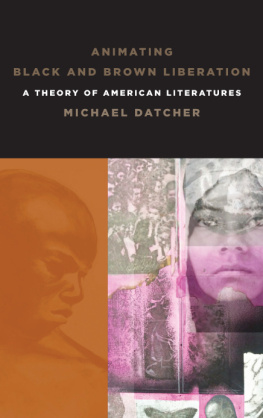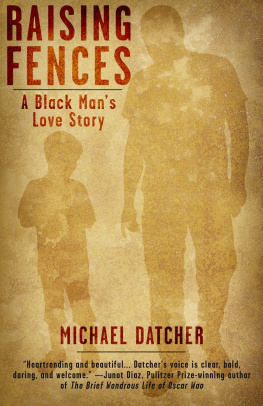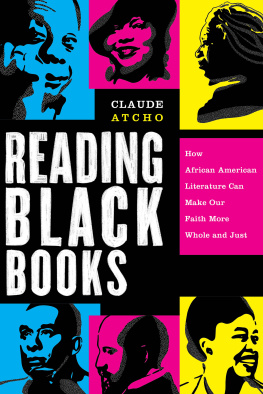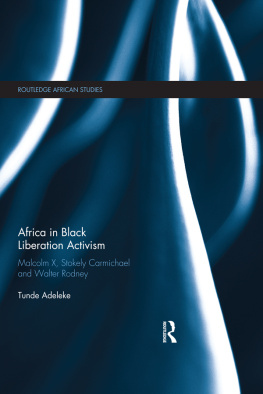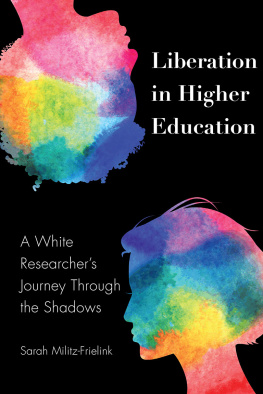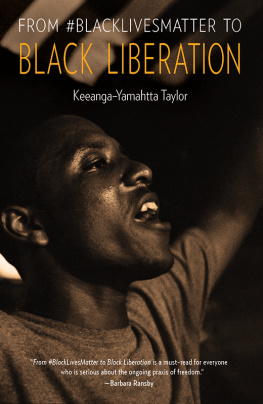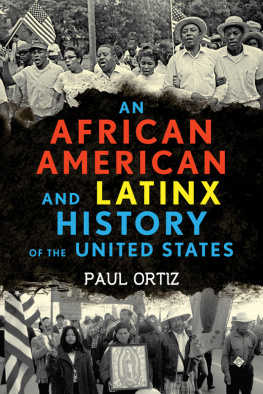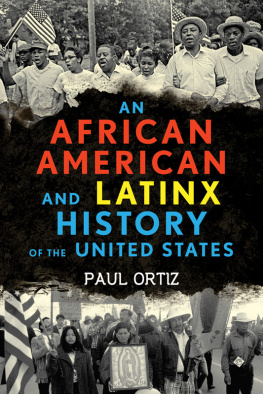Animating Black and
Brown Liberation
Animating Black and
Brown Liberation
A Theory of American Literatures
MICHAEL DATCHER
Cover art: Francisco Letelier.
Published by State University of New York Press, Albany
2019 State University of New York
All rights reserved
Printed in the United States of America
No part of this book may be used or reproduced in any manner whatsoever without written permission. No part of this book may be stored in a retrieval system or transmitted in any form or by any means including electronic, electrostatic, magnetic tape, mechanical, photocopying, recording, or otherwise without the prior permission in writing of the publisher.
For information, contact State University of New York Press, Albany, NY
www.sunypress.edu
Library of Congress Cataloging-in-Publication Data
Names: Datcher, Michael, 1967 author.
Title: Animating black and brown liberation : a theory of American literatures / Michael Datcher.
Description: Albany : State University of New York Press, [2019] | Includes bibliographical references and index.
Identifiers: LCCN 2018020076 | ISBN 9781438473390 (hardcover : alk. paper) | ISBN 9781438473406 (pbk : alk. paper) | ISBN 9781438473413 (ebook)
Subjects: LCSH: American literatureSocial aspects. | Liberty in literature. | Power (Social sciences) in literature. | Liberalism in literature. | American literatureAfrican American authorsHistory and criticism. | American literatureHispanic American authorsHistory and criticism. | Agent (Philosophy) | HegemonyUnited States.
Classification: LCC PS169.L5 D38 2019 | DDC 810.9/3552dc23
LC record available at https://lccn.loc.gov/2018020076
10 9 8 7 6 5 4 3 2 1
Contents
Acknowledgments
First and foremost, I would like to thank Drs. Erica R. Edwards, Vorris L. Nunley, and Tiffany A. Lpez for their intellectual guidance and professional support, which were invaluable in the creation of this book. You have my most sincere gratitude and respect. I would like to thank Dr. Barbara Christian for believing in me enough to spend time with me as an undergraduate and for lighting the flame that now burns in this book. I am so grateful for June Jordan for demonstrating how an engaged artist and public intellectual goes about the peoples work with a spirit of love. I am also grateful of Dr. Marci R. McMahon and two anonymous reviewers whose cogent insight considerably improved this manuscript. Dr. Monica A. Coleman provided an inspiring example of the scholarly life for which I was a beneficiary. I am thankful for Loyola Marymount University and the University of California Riverside for their institutional support. A special nod goes to the World Stage Performance Gallery co-founders Billy Higgins and Kamau Daood for demonstrating and promoting excellence in the arts for the Black community and the world, to Executive Director Dwight Trible for continuing and elevating their vision through exemplary leadership, and to the members of the World Stage Anansi Writers Workshop whose consistent output of excellent literary cultural production is a constant source of inspiration. I am grateful for the love and support that I have received from my mother Gladys Steen, my father Norman Avery, my sister Cynthia Datcher, and my brother Elgin Datcher. My young feminist daughters Eyerusalem Coleman-Kitch and Harlem Coleman-Datcher inspire me with their extraordinary courage, boundless creativity, and fierce commitment to the empowerment of girls and women: I am honored to be your father. Lastly, I am deeply grateful for the wise Latina playwright, actor and educator Carmen Bordas OConnor, my soulmate who loves me like she knows love is a verb.
Introduction
Animacy Matters
La facultad is the capacity to see in surface phenomena the meaning of deeper realities, to see the deep structure below the surface. It is an instant sensing, a quick perception arrived at by the part of the psyche that does not speak, that communicates in images and symbols which are the faces of feelings, that is, behind which feelings reside/hide. The one possessing this sensitivity is excruciatingly alive to the world.
Gloria Anzalda
Why the pathology of race was so dominant a part of Western consciousness or what might be done to change that character was of less concern than how Black peoples might survive the encounter.
Cedric Robinson
At the risk of seeming ridiculous, let me say that the true revolutionary is guided by a great feeling of love. It is impossible to think of a genuine revolutionary lacking this quality We must strive every day so that this love of living humanity will be transformed into actual deeds, into acts that serve as examples, as a moving force.
Ernesto Che Guevara
Liberation Vibrations
Why are embodied Black and Brown subjects (operating as racialized matter for this discussion), too often the targets of irrational violence? In particular, why are alarming numbers of unarmed Black subjects met with lethal force while interacting with the State-sponsored security apparatus? Why is lethal violence against Black and Brown racialized matter insufficiently punished? Why dont Black and Brown lives matter?
On August 3, 2013, the aforementioned questions animated a lively forum at Vibrations, a Black-owned, grassroots cultural center in Inglewood, California. in African American and Latinx neighborhoods; (3) intergenerational miscommunication in African-American and Latinx communities, and the delimiting effects on social justice organizing work resulting from this miscommunication.
Another type of lively forum occurred on November 24, 2014, in Ferguson, Missouri. The outdoor rally addressed questions similar to the Vibrations forum. The intergenerational discussion and rally was a response to the forthcoming indictment decision regarding Ferguson, Missouri, police officer Darren Wilson who shot unarmed Black teenager Michael Brown. Michael Browns mother, Lesley McSpadden, was a rally speaker. When a media-feed announced the non-indictment decision, a distraught McSpadden said to the crowd, Everybody wants me to be calm. Do they know how those bullets hit my son? What they did to his body as they entered his body? Nobody had to live through what I had to live through They still dont care. Theyre never gonna care.
It is significant that McSpaddens comments focused on the impact of State violence on her sons Black body. The Black mothers interrogatives (Do they know how those bullets hit my son? What they did to his body as they entered his body?) are an acknowledgment that the attack was an assault on an embodied Black subject, on Black matter. McSpadden recognized that the assault on her sons Black life was a careless assault, evidenced by her statements, They still dont care. Theyre never gonna care. This perceived careless sentiment is echoed by other rally participants who can be heard shouting, They dont care about us. They dont care about us, can be read as the State does not value Black life: Black embodied matter does not matter.
Taken collectively, McSpaddens response, and those of rally members, echo concerns by some in the African-American community that the perceived, relatively low value of Black life is contributing to the startling phenomena of unarmed Black men being killed by the States security apparatus. In 2014, State security forces killed the following unarmed Black men: Ezell Ford, Akai Gurley, Eric Garner, Mike Brown, Dontre Hamilton, Rumain Brisbon, and Charly Africa Leundeu Keunang.

